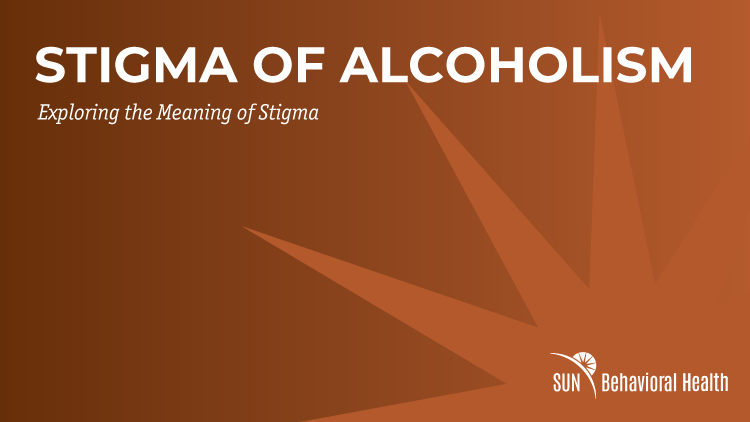Services

Alcohol use was something you felt you could control until you couldn’t. Your feelings surrounding your sense of control worsened with the TV shows and family gatherings that discussed how alcoholism was a choice, and people who had it were just impulsive or lazy. These outlets also seemed to suggest that recovery was not an option and that people with alcohol use disorders could never change. All this talk made you wonder: “why even try?” Everyone thinks it is impossible.
In 2019, only 360,000 people in Delaware reported they drank 5 or more drinks of alcohol a week. While not everyone who drinks 5 or more drinks of alcohol once or twice a week necessarily has an alcohol use disorder, stigma could play a role in the low reporting of alcohol use disorder diagnoses.
SUN Behavioral Health Delaware offers adult IOP in the evening, which is beneficial for those who might feel shame or guilt about an alcohol use disorder caused by stigma. But what is the stigma of alcoholism, and where does it come from?
Stigma is a combination of beliefs, behaviors, structures, and attitudes present in society, whether individually (self-stigma), through organizations or groups (public stigma), or within the larger systems of society (structural stigma), that discriminate against people who are considered different than an arbitrary standard. In the case of the stigma of alcohol use disorders, this looks like prejudice and discrimination against people who have an alcohol use disorder.
Structural stigma often refers to the government, employers, educational institutions, health care, or criminal justice system, whether intentional or not, restricting people from receiving the same benefits or services as someone who does not have an alcohol use disorder. This restriction may look like being unable to have parental custody rights, strict guidelines to maintain housing assistance, or being treated differently than their peers on a college campus. This structural stigma can also exist in the healthcare system and those with alcohol use disorder may receive less funding or a lower quality of care because of it.
Public stigma often comes from the general public or social groups different from the general public. This type of stigma is often branched off of structural stigma as it comes from laws, regulations, and policies that are discriminatory against people with an alcohol use disorder. However, it can also come from the media. People with an alcohol use disorder may experience this form of stigma from family and friends who might not have enough knowledge about alcohol use disorders to understand.
When someone is experiencing the effects of being exposed to stigma, this can form these beliefs in themselves, resulting in deepening self-stigma. Self-stigma may prevent someone from getting help because they might believe that treatment will not help.

There are several stereotypes and stigmas associated with an alcohol use disorder. Some of these beliefs might include:
Even though these beliefs exist, it doesn’t mean they are true. All of these beliefs are false. Having an alcohol use disorder does not make you dangerous or weak, nor does it make you unable to recover because people recover from alcohol use disorders every day, which means you can recover, too. Most importantly, you are not to blame for your alcohol use disorder.
An alcohol use disorder can exist for several reasons, and often, it is a combination of reasons. For example, someone who grew up in a household where a parent or older sibling regularly drank alcohol around them might have experienced trauma or peer pressure that has led to them using alcohol more often. It might also indicate a genetic component that makes them more likely to experience an alcohol use disorder. An alcohol use disorder also may result from depression or anxiety. With many reasons why an alcohol use disorder exists, it is essential to remember that you are not to blame for an alcohol use disorder.
There can be several reasons why stigma might exist towards alcohol use disorders. These reasons include blame, as described above, but can also come from other factors. For example, the media often portrays people with an alcohol use disorder as being dangerous or unable to recover. This portrayal leads the general public to believe people with alcohol use disorders are dangerous and unable to recover, which can be harmful to those who have an alcohol use disorder as they might internalize this messaging.
Also, a lack of education or experience about alcohol use disorder can result in people having negative beliefs about alcohol use disorders. This lack of knowledge can come from the general public, who sees misinformation from the media and healthcare providers, not in the behavioral health field, who do not interact with people with alcohol use disorders.
So, why is the existence of stigma such a big deal? The significant role stigma plays dictates the way people view themselves. If someone has an alcohol use disorder and their perceived world is telling them that people with an alcohol use disorder are weak and can never recover, they will begin to believe that must also be true about them.
People with self-stigma will often experience low self-esteem and are more likely to have feelings of shame or embarrassment. These feelings can result in actions such as having a difficult time recognizing they have an alcohol use disorder, being afraid to seek assistance, and the potential to experience a return to use.
Stigma might prevent someone from being able to recognize that they have an alcohol use disorder. Often, this prevention occurs when someone’s personal experience with an alcohol use disorder does not match up with what stigma tells them. For example, the stigma that people with an alcohol use disorder are dangerous. If those around them and the media are telling someone that people with an alcohol use disorder are dangerous, but someone with an alcohol use disorder does not have any personal violent tendencies, they might believe they don’t have a problem – they may drink a lot, but they’re not violent. So why seek treatment?
Likewise, if they do know they have an alcohol use disorder, they may not want to seek assistance. In society, there is often an “I can do it myself” mentality when it would be better for everyone to accept help and assistance when needed. When it comes to an alcohol use disorder, many people are successful with treatment and assistance; however, stigma can hold people back from receiving this assistance because they are afraid they are weak or unable to recover.
Suppose they know they have an alcohol use disorder and get treatment, stigma might still result in them returning to use alcohol. A stigma-influenced return to use might occur, especially if they believe that the stigma that they can never recover or change their behaviors. They might also think that they are weak. These beliefs bring the belief of “So, why try,” which continues to harm people’s self-esteem and make it more difficult to seek and continue with treatment.

As a single person reading this blog post, it can be challenging to change structural and public stigma independently. Changing these types of stigma requires laws, policies, and regulations to be changed legally. These levels often involve legislators, institutions, and policymakers targeting areas where stigma exists. It also involves changing the way the media portrays alcohol use disorders or the way the general public views people with an alcohol use disorder. While you can work to solve public stigma by informing others and dispelling myths to those around you, it can be challenging to target all of the general public.
However, you can lower self-stigma through interactions that you can have with other people. For example, empowering, educating, and encouraging people with an alcohol use disorder to seek treatment can be beneficial. Using person-first language and avoiding labels like “alcoholic” and “addict” can help people feel like they are less stuck in their situation. These actions can allow them to know that they have at least one person who believes they can take back control of their life from alcohol. Encourage your loved ones to continue their treatment plans or practice skills learned during treatment. Over time, this will begin to give them confidence that they can recover from alcohol use.
When deciding to start alcohol detox, you want one that is stigma-free and understanding of your concerns. Trying to heal in an environment that is full of stigma can make it challenging to continue to believe that you have a chance at recovery. However, by choosing a place to heal that is free from stigma and instead lifts you and encourages you to continue treatment, it will be easier to achieve success.
Located in Georgetown, DE, SUN Behavioral Health Delaware solves unmet needs in the community. Our no-cost care assessments allow you to meet with a representative to determine the best plan for your care. For more information or to get started on your alcohol use disorder treatment, call us at 301-604-5600 today.